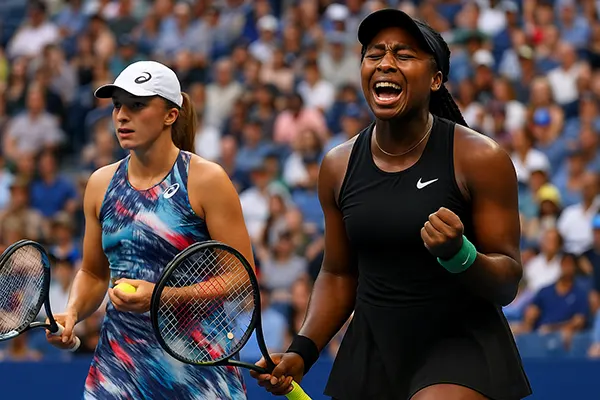The U.S. Open 2025 has become more than just a tennis championship. It now serves as a mirror reflecting deeper cultural tensions within the sport and society at large. Recent incidents have sparked debate about whether tennis is still guided by its long-standing codes of conduct or shifting towards a more emotionally charged and socially sensitive stage. From Daniil Medvedev’s controversial gesture towards the crowd to Jelena Ostapenko’s accusations and Coco Gauff’s emotional displays, the tournament has turned into a showcase of conflicting values.
Medvedev and the Clash of Sports Ethics
Daniil Medvedev, known for his fiery temperament, drew global attention when he gestured provocatively towards the stands during a tense match. While some applauded his passion, others viewed it as a breach of tennis etiquette. This moment reignited the debate over the balance between emotional authenticity and the discipline that has historically defined the sport.
Traditionally, tennis has been framed by ideas of composure, self-control, and respect for opponents and audiences. Medvedev’s action challenged these norms, symbolising a new era where athletes express themselves freely, even at the cost of controversy. His behaviour has divided fans and experts, raising questions about whether tennis should adapt to a more expressive culture or safeguard its classic values.
The controversy is not just about one player’s attitude. It is about the evolution of sport itself. As tennis continues to attract a younger audience, the boundaries between passion and provocation become increasingly blurred. Medvedev’s act may well mark a turning point in redefining what sportsmanship means in 2025.
Public Reactions and Cultural Divides
The reactions to Medvedev’s behaviour were far from uniform. European media highlighted it as a natural shift in modern sport, while more traditionalist circles in the United States emphasised the importance of preserving decorum. This polarisation demonstrates how cultural standards are no longer universal within tennis but are influenced by broader societal values.
For many, his action was not just a breach of etiquette but a reflection of generational divides. Younger fans often celebrate individuality and raw emotion, while older fans see discipline as essential to the integrity of the sport. This intergenerational debate is reshaping the identity of tennis both on and off the court.
What emerges is a sport caught between two identities: one rooted in centuries-old traditions of elegance, and another driven by the emotional authenticity demanded by modern spectators. Medvedev’s case epitomises this conflict.
Ostapenko, Townsend, and Unwritten Rules
Another defining moment at the U.S. Open 2025 was Jelena Ostapenko’s accusation against Taylor Townsend. Ostapenko argued that Townsend had violated the unwritten codes of fairness, adding an extra layer of racial tension to the discussion. What might have been a straightforward on-court disagreement quickly evolved into a broader cultural debate.
Tennis has long prided itself on sportsmanship, often enforced through invisible but respected rules. When Ostapenko’s comments drew attention to these rules, the issue escalated beyond the match itself. It became a discourse on how unwritten traditions can both maintain integrity and create exclusionary barriers within the sport.
The situation illustrated how the “rules of the game” are not just about points and rallies but about cultural assumptions. In 2025, such disputes remind us that tennis is not immune to the same societal divisions present elsewhere, including those linked to race, identity, and fairness.
The Role of Race and Identity
The Ostapenko-Townsend incident highlights how race and identity are increasingly central to sporting narratives. Townsend, as an African American athlete, has often faced scrutiny that her white peers may not experience in the same way. Ostapenko’s accusations were therefore interpreted through a sensitive cultural lens, amplifying the impact.
This moment raised questions about inclusivity in tennis and whether the sport is truly adapting to the diversity of its players and fans. It showed how unwritten codes, while meant to preserve sportsmanship, can also be weaponised in ways that deepen divisions. Such issues resonate far beyond the court, reflecting broader debates about race and fairness in society.
By forcing tennis into this discussion, the incident revealed the sport’s dual role as both a competitive discipline and a cultural stage where societal tensions play out in real time.

Coco Gauff and Emotional Vulnerability
Coco Gauff, one of the brightest stars of modern tennis, has openly displayed her emotions throughout the tournament. Her tears, frustrations, and resilience have sparked a wave of discussion about the role of vulnerability in professional sport. For some, Gauff represents a departure from the stoic image of tennis champions of the past.
Her openness resonates with a younger generation that values authenticity over perfection. Gauff’s willingness to be emotionally transparent challenges the stereotype of the invulnerable athlete, reframing success not just as victory on the scoreboard but as honesty in human expression. In 2025, her presence on the court reflects a cultural shift towards embracing vulnerability as strength.
This transformation is significant. By embodying emotional honesty, Gauff has become more than an athlete: she is a symbol of modern sport’s evolving values. Her journey is shaping how tennis is perceived globally, with fans recognising that athletes are not only performers but also human beings navigating immense pressures.
Tennis as a Cultural Mirror
Gauff’s emotional openness underlines the broader idea that tennis is no longer just a sport but a cultural mirror. Every serve, rally, and post-match interview is now framed within the context of societal expectations and values. This makes the game a powerful reflection of contemporary debates about authenticity, diversity, and identity.
For younger fans, tennis players like Gauff embody what it means to be both talented and relatable. For others, such emotional displays challenge the image of discipline and control that once defined champions. This divergence further demonstrates the cultural transformation currently shaping the sport.
Ultimately, the U.S. Open 2025 shows that tennis is not isolated from the wider world. It is deeply intertwined with the cultural shifts of our time, reflecting society’s evolving standards of ethics, emotion, and identity.
